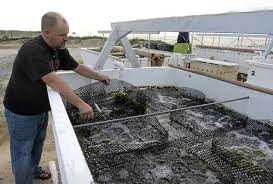Principal Investigator: Ana Pitchon
Project Team: Alisha Ragland, Joseph Carpio
California is poised to become a major producer of farmed marine products given our extensive coastline and the state’s priorities for economic growth. Aquaculture is an industry that has profound environmental, economic and social impacts, and we are investigating how a transition to this activity from wild-capture fishing has the potential to create resilient coastal communities. 
This research addresses specific resilience indicators among those who wish to engage in the transition from wild-capture commercial fishing to involvement in a local aquaculture cooperative through an assessment of variables related to well-being/quality of life. Engagement in the aquaculture industry can alleviate economic pressures faced by the commercial fishing industry due to declining stocks, increased regulation and restricted access. There are several cases in the United States where communities have transitioned to aquaculture after regulation of their fisheries imposed closures that forced an industry shift. These communities have demonstrated resilience by maintaining their connection to marine resources and other associated socio-cultural characteristics, like social networks. We are also conducting policy analysis related to the regulatory and permitting process in the state, with the aim of making this information more accessible and ultimately streamlining the process to facilitate involvement in the industry.
Given some current negative trends in commercial fishing in California, it is clear that small-scale fishermen here will need to adapt to the changing social and ecological environment if they want to create a sustainable solution for themselves and their communities.